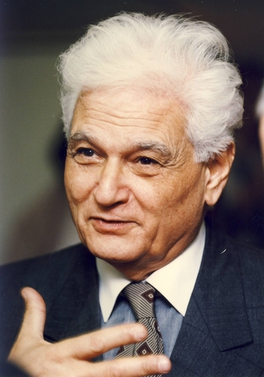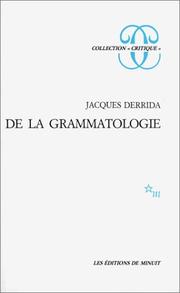Deconstruction is a loosely-defined set of approaches to understanding the relationship between text and meaning. The concept of deconstruction was introduced by the philosopher Jacques Derrida, who described it as a turn away from Platonism's ideas of "true" forms and essences which are valued above appearances.
The Sokal affair, also called the Sokal hoax, was a demonstrative scholarly hoax performed by Alan Sokal, a physics professor at New York University and University College London. In 1996, Sokal submitted an article to Social Text, an academic journal of cultural studies. The submission was an experiment to test the journal's intellectual rigor, specifically to investigate whether "a leading North American journal of cultural studies—whose editorial collective includes such luminaries as Fredric Jameson and Andrew Ross—[would] publish an article liberally salted with nonsense if (a) it sounded good and (b) it flattered the editors' ideological preconceptions."

Jacques Derrida was an Algerian-born French philosopher. He developed the philosophy of deconstruction, which he utilized in a number of his texts, and which was developed through close readings of the linguistics of Ferdinand de Saussure and Husserlian and Heideggerian phenomenology. He is one of the major figures associated with post-structuralism and postmodern philosophy although he distanced himself from post-structuralism and disowned the word "postmodernity".
In critical theory and deconstruction, phallogocentrism is a neologism coined by Jacques Derrida to refer to the privileging of the masculine (phallus) in the construction of meaning. The term is a blend word of the older terms phallocentrism and logocentrism.
Philippe Lacoue-Labarthe was a French philosopher. He was also a literary critic and translator. Lacoue-Labarthe published several influential works with his friend Jean-Luc Nancy.
Geoffrey Bennington is Asa Griggs Candler Professor of French and Professor of Comparative Literature at Emory University in Georgia, United States, and Professor of Philosophy at the European Graduate School in Saas-Fee, Switzerland, as well as a member of the International College of Philosophy in Paris. He is a literary critic and philosopher, best known as an expert on deconstruction and the works of Jacques Derrida and Jean-François Lyotard. Bennington has translated many of Derrida's works into English.
"Structure, Sign, and Play in the Discourse of the Human Sciences" was a lecture presented at Johns Hopkins University on 21 October 1966 by philosopher Jacques Derrida. The lecture was then published in 1967 as chapter ten of Writing and Difference.

Glas is a 1974 book by the French philosopher Jacques Derrida. It combines a reading of Georg Wilhelm Friedrich Hegel's philosophical works and of Jean Genet's autobiographical writing. "One of Derrida's more inscrutable books," its form and content invite a reflection on the nature of literary genre and of writing.
Drucilla Cornell, was an American philosopher and feminist theorist, whose work has been influential in political and legal philosophy, ethics, deconstruction, critical theory, and feminism. Cornell was an emerita Professor of Political Science, Comparative Literature and Women's & Gender Studies at Rutgers University the State University of New Jersey; Professor Extraordinaire at the University of Pretoria, South Africa; and a visiting professor at Birkbeck College, University of London. She also taught for many years on the law faculties of the University of Pennsylvania and of Cardozo Law School of Yeshiva University.
Christopher Wise is a cultural theorist, literary critic, scholar, and translator. His publications largely focus on Sahelian West Africa, especially Mali, Burkina Faso, and Senegal, as well as Palestine, Jordan, and Israel. He has also published theoretical works on Fredric Jameson, Jacques Derrida, and Noam Chomsky.

Bernard Stiegler was a French philosopher. He was head of the Institut de recherche et d'innovation (IRI), which he founded in 2006 at the Centre Georges-Pompidou. He was also the founder in 2005 of the political and cultural group, Ars Industrialis; the founder in 2010 of the philosophy school, pharmakon.fr, held at Épineuil-le-Fleuriel; and a co-founder in 2018 of Collectif Internation, a group of "politicised researchers" His best known work is Technics and Time, 1: The Fault of Epimetheus.

Of Grammatology is a 1967 book by the French philosopher Jacques Derrida. The book, originating the idea of deconstruction, proposes that throughout continental philosophy, especially as philosophers engaged with linguistic and semiotic ideas, writing has been erroneously considered as derivative from speech, making it a "fall" from the real "full presence" of speech and the independent act of writing.
Peggy Kamuf is the Marion Frances Chevalier Professor of French and Comparative Literature at the University of Southern California. She is one of the primary English translators of the works of Jacques Derrida. She received the American Comparative Literature Association's 2006 René Wellek Prize for her 2005 work Book of Addresses.
Hugh J. Silverman was an American philosopher and cultural theorist whose writing, lecturing, teaching, editing, and international conferencing participated in the development of a postmodern network. He was executive director of the International Association for Philosophy and Literature and professor of philosophy and comparative literary and cultural studies at Stony Brook University, where he was also affiliated with the Department of Art and the Department of European Languages, Literatures, and Cultures. He was program director for the Stony Brook Advanced Graduate Certificate in Art and Philosophy. He was also co-founder and co-director of the annual International Philosophical Seminar since 1991 in South Tyrol, Italy. From 1980 to 1986, he served as executive co-director of the Society for Phenomenology and Existential Philosophy. His work draws upon deconstruction, hermeneutics, semiotics, phenomenology, aesthetics, art theory, film theory, and the archeology of knowledge.
Roberto Rino Magliola is an Italian-American academic specializing in European hermeneutics and deconstruction, comparative philosophy, and inter-religious dialogue. He is retired from National Taiwan University and Assumption University of Thailand.
Trace is one of the most important concepts in Derridian deconstruction. In the 1960s, Jacques Derrida used this concept in two of his early books, namely Writing and Difference and Of Grammatology.
Ethan Kleinberg works on the acrobatics of modern thought. He is Class of 1958 Distinguished Professor of History and Letters at Wesleyan University, Editor-in-Chief of History and Theory and was Director of Wesleyan University's Center for the Humanities. Kleinberg's research interests include European intellectual history with special interest in France and Germany, critical theory, educational structures, and the philosophy of history. Kleinberg's wide-ranging scholarly work spans across the fields of history, philosophy, comparative literature and religion. Together with Joan Wallach Scott and Gary Wilder he is a member of the Wild On Collective who co-authored the "Theses on Theory and History" and started the #TheoryRevolt movement. He is the author of Emmanuel Levinas's Talmudic Turn: Philosophy and Jewish Thought (SUP); Haunting History: for a deconstructive approach to the past (SUP); Generation Existential: Martin Heidegger’s Philosophy in France, 1927-61 (CUP) which was awarded the 2006 Morris D. Forkosch prize for the best book in intellectual history by the Journal of the History of Ideas and co-editor of the volume Presence: Philosophy, History, and Cultural Theory for the Twenty-First Century (CUP). He is completing a book length project titled The Surge: a new compass of history for the end-time of truth.
Niall Lucy was an Australian writer and scholar best known for his work in deconstruction.
David Robert Wills is a noted translator of Jacques Derrida, including The Gift of Death, Right of Inspection, Counterpath, and The Animal That Therefore I Am. Currently, Wills is a professor of French at Brown University.




